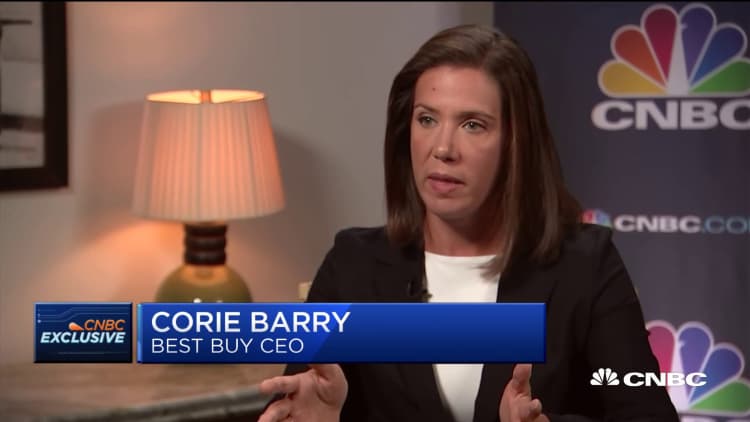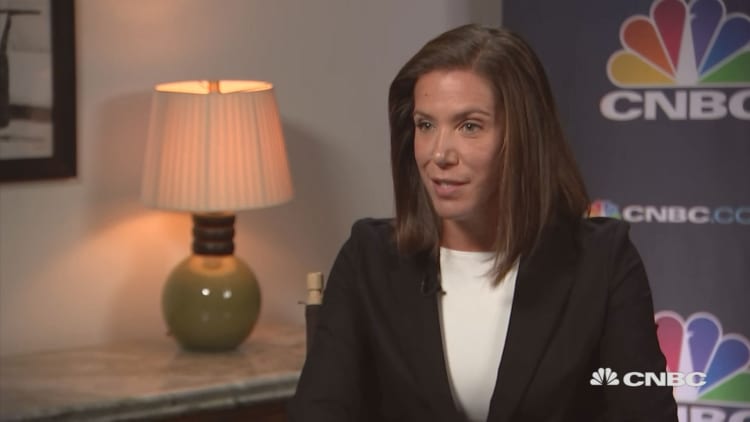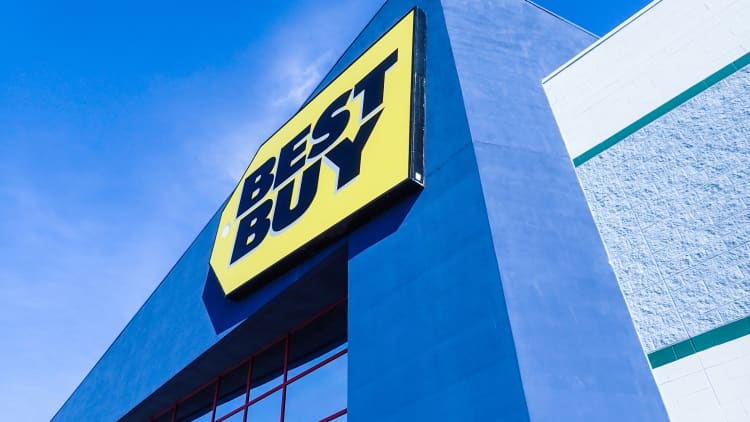
Best Buy CEO Corie Barry said it's time for the company to double down on its strategy.
"We're the last consumer electronics retailer, and we offer unique advantages to both our vendors and our customers," Barry said in an interview with CNBC. "If you're going to hinge on a strategy that's built around these unique customer relationships, I think you actually double down on it in times of ... disruption."
Barry, who previously served as Best Buy's chief financial officer, took over as CEO in June. She is the first woman to lead the Minnesota-based company, and, at 44, she is the youngest female CEO in the Fortune 100.
Her predecessor Hubert Joly joined Best Buy in 2012 and set to work on creating a plan to turn around the company. He pivoted to focus on its in-home advising service, building a health-care technology business and growing partnerships with tech behemoths including Amazon.
On Wednesday, Best Buy will hold its first investor day in two years at the New York Stock Exchange. The retailer will update the financial community on how this strategy will evolve. It also will discuss its five-year financial forecasts, which include hitting $50 billion in revenue in fiscal year 2025 at a 5% operating income rate — implying a compound annual revenue growth rate of about 3%.
Despite its recent success, Best Buy faces headwinds from the Trump administration's trade policies on goods made in China. Sixty percent of Best Buy's cost of goods sold are subject to tariffs, though Barry has said that could go down to around 40% next year based on a number of mitigation strategies underway with both its vendors and the retailer itself.

Tariffs prompt conservative forecast
Best Buy's financial forecast has some "conservatism" built in to account for the possibility that consumer spending is curtailed as a result of tariffs, and the disruption it could cause. The big question that remains unanswered is what the long-term impact will be of the trade policy.
"I have not personally talked to the president, but our teams have clearly been engaged with the administration," Barry said. "We've been part of the public comment process, and our goal is to do as much as we can to help educate [regarding] the implications, particularly for consumer electronics, and then ultimately for the consumer, when you're talking about tariffs of this magnitude."
The most recent tariff list, referred to as List 4, levies a duty of 15%. Levies on a portion of the list went into effect on Sept. 1. These items include TVs, headphones and smartwatches. The rest of the list will go into effect on Dec. 15.
But when asked how it's impacted costs, and ultimately, the prices shoppers pay at Best Buy, it's not entirely clear exactly which items are subject to tariffs, Barry explained.
"The lists themselves are still in the process of being stabilized. We've spent a ton of time, and we have excellent teams combing these lists, but they are not easy to read," she said.
Once it's determined what is subject to a tariff, Best Buy then considers how it might mitigate the costs, which is also a moving target.
"We're working closely with our vendors. We're bringing product in early. We're talking about mitigation strategies. You're continuing to see supply chains move," she said.
Once these strategies are in place, the last step is to consider whether, and where, to raise prices. Barry acknowledged the retailer looks at its portfolio and tries to find products where consumers are less likely to show sensitivity to price increases. However, with nearly all consumer goods made in China now subject to tariffs, it's harder to do.
"You're going to see here heading into holiday, it's actually going to be very hard to track directly through a perfect 10% or 25% tariff," Barry said.
No consumer slowdown in sight
When asked if Best Buy had seen a slowdown in consumer spending as consumer confidence hit a nine-month low, she said "we really aren't."
While she saw the confidence reading, Barry said "there are so many underlying metrics that are still quite healthy. Unemployment is at 3.7%, there's really low wage growth continuing. You also saw the most housing starts we've seen in 11 years in August. And so you're not seeing this degradation of the consumer broadly."
Still, Barry said she and her team are "keeping on eye on things," and making sure the retailer can "navigate whatever the environment looks like into the back half."
Shares of Best Buy are up more than 25% so far this year, as the consumer electronics retailer has managed to navigate through a tumultuous time in retail.
It wasn't that long ago that many wondered if Best Buy would suffer the same fate as one-time competitors Circuit City and Radio Shack. To do that, Best Buy had to survive the competition from Amazon and changing consumer preferences. Barry's predecessor Hubert Joly took over in 2012 and led the company through a transformation to move it beyond being a showroom for Amazon.
"What we've moved to is absolutely a position of differentiation and a strong point of view," Barry said, explaining that the retailer has a "unique combination of tech and touch, where not only can we help you with the highest-end technology, but we can add that bit of human touch."
Beyond its 1,000-store network and its website, which now makes up around 16% of its U.S. sales, Best Buy has been expanding its services. In the second quarter, its service comparable sales grew 10.7%. It now has 700 in-home advisors, which evaluate consumers' homes and make technology recommendations for free.
Consumers that use the in-home advisors "tend to buy more in the moment, and over time they have a much deeper relationship with us. They tend to come back more frequently," Barry said.
The consumer electronics retailer is also moving into senior home health care by applying technology to help the country's aging population live independently in their homes safely and for longer. It's made several acquisitions, including buying GreatCall, which makes connected health and emergency alert devices, for $800 million. Barry said it's a big opportunity as 10,000 people turn 65 every day in the United States.
Morgan Stanley recently said the effort was "underrated" by investors. The firm estimates Best Buy's push could unlock $11 billion to $46 billion in potential revenue for the company, long-term.
When looking at the total picture, despite uncertainty caused by tariffs and the possibility of a consumer slowdown, Barry is confident Best Buy's strategy can keep the retailer anchored.
"We actually have more confidence over the longer term," Barry said. "No matter what, everything kind of stabilizes and you get back into a run rate. At the end of the day, our strategy, we feel so strongly about that, whether it's booming growth or whether it's not, the strategy still is relevant."



